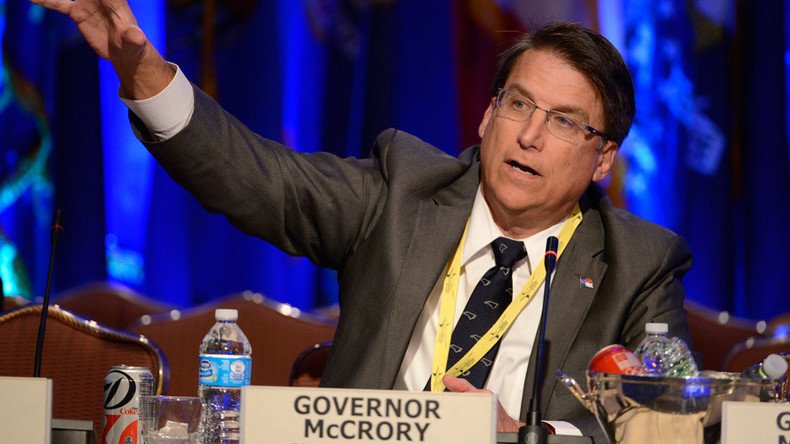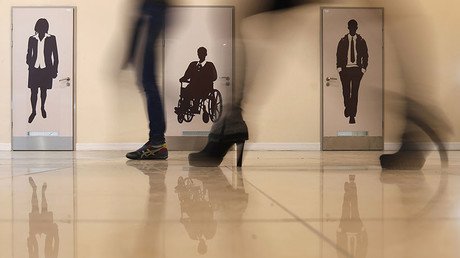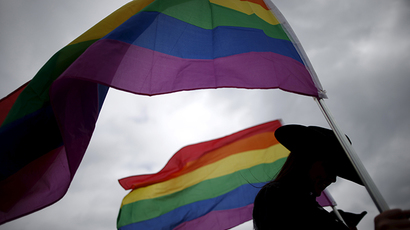North Carolina sued over 'anti-LGBT' law as Georgia vetoes similar bill

The ACLU and others have sued North Carolina officials over a new law that bars local governments from enacting anti-discrimination ordinances and bans transgender people from restrooms consistent with their adopted gender identity.
On Monday, the American Civil Liberties Union of North Carolina, Equality North Carolina and three individual plaintiffs filed a lawsuit in federal court against the Republican Governor Pat McCrory and other state officials over House Bill 2 – also known as the Public Facilities Privacy and Security Act – which was introduced and passed within the span of 12 hours during a special one-day session on March 23.
The special session was called in order to block a city ordinance passed in Charlotte that was due to go into effect on April 1. The ordinance would have made it illegal to discriminate against lesbian, gay, bisexual and transgender (LGBT) people in a range of settings – such as housing, employment, and business transactions ‒ and in public accommodations, such as restrooms. This would have meant granting transgendered individuals access to public restrooms that correspond with their adopted gender identity.
House Bill 2 blocks such ordinances, mandating that all employment, wages and public accommodations measures by local governments be in line with state law. It also restricts public bathrooms and locker rooms in any government building, including public universities and colleges, to people with the corresponding biological sex as listed on their birth certificate. Transgendered people who had their birth certificate changed would not be affected, however.
The law approved “equal access to public accommodations” based on race, religion, color, and biological sex, but not sexual orientation or gender identity.
Legal Director @ChrisBrookACLU: #HB2 process was "a farce." Legislators given 5 minutes to read bill #WeAreNotThispic.twitter.com/cGJ1C2suEV
— ACLU-North Carolina (@ACLU_NC) March 28, 2016
“By singling out LGBT people for disfavored treatment and explicitly writing discrimination against transgender people into state law, HB 2 violates the most basic guarantees of equal treatment and the US Constitution,” the lawsuit says.
The lawsuit continues: “HB 2 was motivated by an intent to treat LGBT people differently, and worse, than other people, including by stripping them of the protections afforded by the City of Charlotte’s Ordinance and precluding any local government from taking action to protect LGBT people against discrimination."
See you in court, North Carolina! https://t.co/vE0rzppQUCpic.twitter.com/gaA0JEjeIw
— Lambda Legal (@LambdaLegal) March 28, 2016
Plaintiffs in say the measure is a denial of Fourteenth Amendment rights – guaranteeing equal protection under the law – and that it discriminates against LGBT people in particular by imposing "a different and more burdensome political process on LGBT people than on non-LGBT people who have state protection against identity-based discrimination.”
They added that the law violates federal Title IX statutes that outlaw discrimination in publicly funded schools on the basis of sex. These infractions could cost the state $4.5 billion in federal funding, ACLU of North Carolina legal director Chris Brook said.
A plaintiff, Joaquin Carcano, says #hb2 is particularly dangerous for trans women pic.twitter.com/NOzMbczoYK
— Briana Conner (@BrianaReports) March 28, 2016
Supporters of HB2 argue that the Charlotte ordinance ‒ and others like it ‒ would allow any man to enter a woman’s bathroom or locker room just by identifying himself as transgender.
“The basic expectation of privacy in the most personal of settings, a restroom or locker room, for each gender was violated by government overreach and intrusion by the mayor and city council of Charlotte,” Gov. McCrory said in a statement.“This new government regulation defies common sense and basic community norms by allowing, for example, a man to use a woman's bathroom, shower or locker room.”
Critics of the bill have called the governor's arguments baseless and dependent on fear.
"Nothing about Charlotte’s nondiscrimination law or any other law or policy in North Carolina would have allowed men into women’s restrooms," ACLU's Chase Strangio wrote, pointing to experts who have said states across the US that have outlawed discrimination in public accommodations have not had problems or reports of sexual assaults as a result of their laws.
In 17 states and 225 cities in the US that have barred LGBT discrimination, there have been no known incidents of violent or predatory acts in restrooms or locker rooms that were aided or facilitated by the laws, Buzzfeed reported.
.@equalitync's Chris Sgro: No public safety concerns in 200+ cities w/ ordinances similar to Charlotte #WeAreNotThispic.twitter.com/AdQP93ws6A
— ACLU-North Carolina (@ACLU_NC) March 28, 2016
Responding to the rising clamor over the law, Gov. McCrory said Friday that the law was about Charlotte's attempt to supersede state law.
“North Carolina is one of at least 37 states like Virginia where cities and towns cannot pass rules or regulations that exceed the authority given to them by the state,” said the governor’s press release. “In passing the bathroom ordinance, Charlotte was exceeding its authority and setting rules that had ramifications beyond the City of Charlotte.”
#HB2 has made us feel less welcome and less safe in NC. It's personal. It sends a message that we're not welcome. pic.twitter.com/EBswMk4qcN
— ACLU-North Carolina (@ACLU_NC) March 28, 2016
Opponents of the law include major corporations such as Apple, Google, Facebook, American Airlines, Bank of America, and IBM, though none have said they would pull their business from the state.
Corporations denounce North Carolina's anti-LGBT law, but fund politicians who passed it https://t.co/HYIZeUHYxg by @tinyrevolution
— The Intercept (@the_intercept) March 28, 2016
HB2 has drawn comparisons to controversial religious freedom laws passed by several states, which critics say aim to allow discrimination against LGBT persons based on religious beliefs. Georgia recently passed such a law. After backlash from the likes of the National Football League and the film industry, Republican Governor Nathan Deal vetoed the measure on Monday, saying, "I do not think we have to discriminate against anyone to protect the faith-based community in Georgia."
Notice corporations never threatened Nathan Deal because he refuses to expand Medicaid. They have their priorities too
— Zaid Jilani (@ZaidJilani) March 28, 2016
















